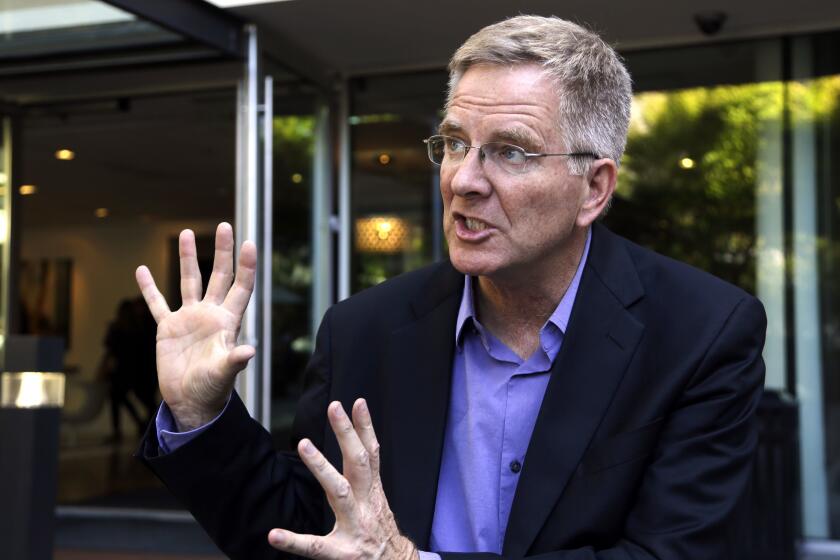Voice of America Chief Heeds Call Home
On the way to see the head of the Voice of America, visitors pass a series of photographs of former directors that line a third-floor hallway in the U.S. Information Agency building.
The first was actor, director, writer and latter-day TV pitchman John Houseman.
VOA’s second boss, Louis G. Cowan, was appointed by President Franklin D. Roosevelt 18 months later in August 1943.
And today his son Geoffrey is the 19th director.
A Clinton political appointee, Cowan took over the $122,688-a-year job in March 1994.
There was never any outright plan to follow in the footsteps of his father, who died 20 years ago this fall (but “would have been tremendously proud,”) Cowan says.
With about half a year left to go, Cowan, 54, is winding up his tour of duty running the country’s best-known radio broadcast service to foreign lands, serving up news, information and Americana in 47 languages to a weekly audience in the tens of millions worldwide.
But his heart belongs to Brentwood--and the home he left two years ago when he came to Washington. “I love L.A,” Cowan says. “We have lots of family there, and the thought of going back is very exciting.”
USC announced this week that starting in January, Cowan will become the dean of the Annenberg School of Communication, overseeing nearly 1,000 students and 50 full- and part-time professors.
For 20 years, Cowan taught communications law and was until recently director of the Center for Communication Policy at archrival UCLA.
“I am torn about it,” Cowan concedes. “I love UCLA. [In his student years] I went from Harvard College to Yale Law School and felt a little guilty about it and a little bit of excitement about it at the same time. This is like that.”
Executing the cross-town academic arabesque should not slow down Cowan, whose varied resume seems lifted from a movie script--though motion pictures is one of the few areas where he has not yet excelled.
He started a public interest law firm, authored a best-selling book on lawyer Clarence Darrow, produced an Emmy-winning television movie on Mark Twain and was once the principal owner of the Stockton Ports, a Class A farm team for the Milwaukee Brewers.
When questions were raised in the late 1980s about former Mayor Tom Bradley’s ties to two area banks, Cowan chaired the commission that wrote a tough ethics code for city officials.
But running the Voice of America has been a unique thrill, giving Cowan a measure of the world’s hunger for America’s stories, be they historical or topical.
“It’s amazing to realize how many people in the world rely on the Voice of America . . . as often the only and the most important news that they get of America, of the world and often of their own countries,” Cowan says.
But Cowan’s stewardship has coincided with significant cutbacks in Voice of America staffing and budgets. The end of the Cold War led some in Congress to question whether Voice of America still had a role to play.
Faced with new faces in the 104th Congress intent on paring back the federal government’s responsibilities, Cowan had to appeal to human rights advocates in both parties to stave off calls for severe budget cutbacks--even defunding altogether.
A consolidation of international broadcasting programs wound up calling for a cut of 20% from 1994 to 1996, Cowan says, leading to staff reductions of nearly 400 employees.
“The cut has been more like 25%. Given the reductions elsewhere in federal budget, we came out respectably,” Cowan says.
Rep. Julian C. Dixon (D-Los Angeles), a Cowan supporter whose appropriations subcommittee oversees the VOA budget, offers a historical view: “Previous directors didn’t have the challenge to keep the program alive. Nor have previous directors been so creative.”
Even would-be critics give Cowan high marks.
Voice of America “has taken a lot of heat, but it’s done better than it would have if he hadn’t been there,” says Joshua Muravchik, a scholar at the American Enterprise Institute in Washington. “I was skeptical because I am a neoconservative and his reputation is as a liberal. In an ideological sense, I looked at him through beady eyes. But he’s been . . . a champion for his agency. He brought an elan and conviction to the job that few others would have done at a time when it was really on the chopping block.”
Cowan can point to victories and innovations, too.
The first international call-in show was introduced during his regime, and a series of radio dramas with actors such as Ed Asner and Richard Dreyfuss is in the offing. A powerful new transmitter in Kuwait is beaming the Voice of America message to listeners in Iran and Iraq.
But he also realizes the limitations. “In public service, you come in with new ideas and then hand off to the next person with new ideas,” Cowan says.
With the end of his Washington tour in sight, his thoughts drift forward to old friends and a new job in Los Angeles.
So who will he root for, USC or UCLA?
“It will hard to give up the Bruins,” he waffles, “but I haven’t been to USC yet.”
Sign up for The Wild
We’ll help you find the best places to hike, bike and run, as well as the perfect silent spots for meditation and yoga.
You may occasionally receive promotional content from the Los Angeles Times.



